#character name in title
Explore tagged Tumblr posts
Text
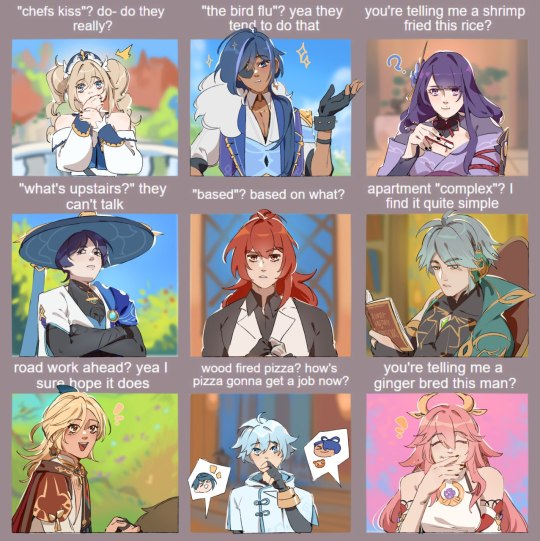
#genshin impact#fanart#artists on tumblr#barbara#barbara pegg#kaeya#kaeya alberich#raiden shogun#ei#scaramouche#wanderer#diluc#diluc ragnvindr#al haitham#kaveh#chongyun#yae miko#not me looking at the almost finished pic and thinking well i wonder how it would look with a background#and then drawing albeit messily a bg for every character#also not mw looking at the tags and thinking i can add more titles and names
12K notes
·
View notes
Text
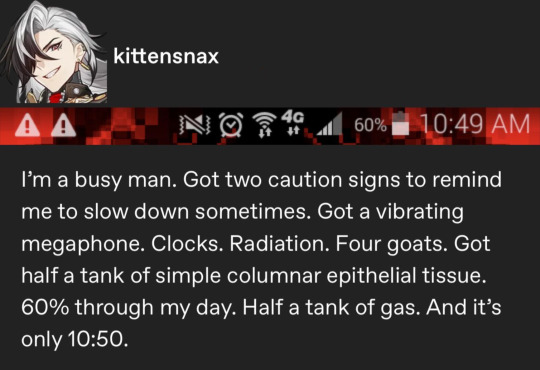
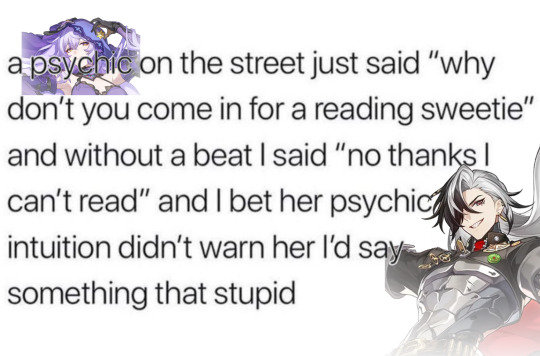

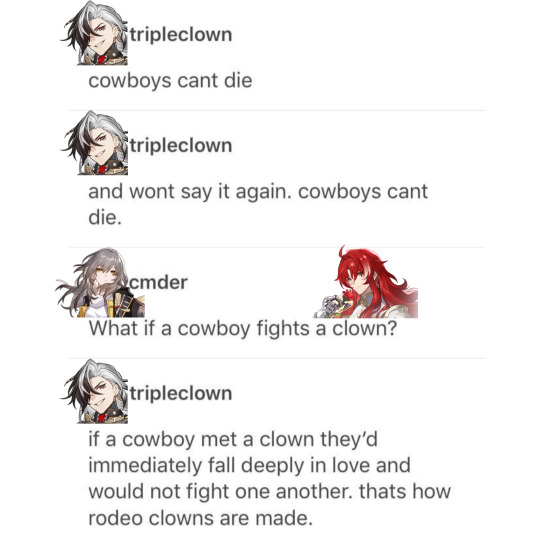

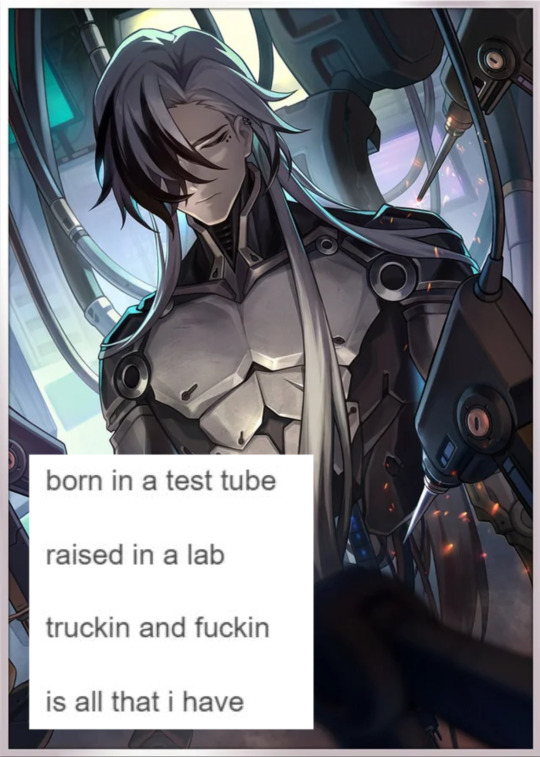
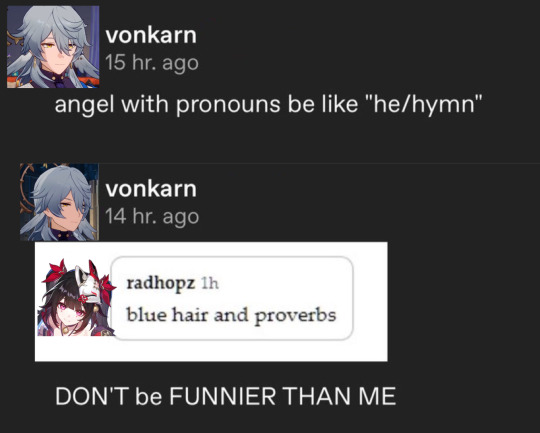
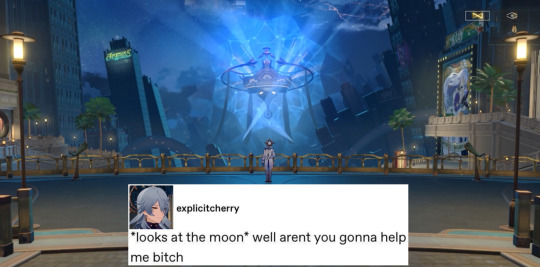


Making Incorrect H:SR Quotes Until I Run Out of (hopefully) Original Ideas - Pt. 6
[Pt. 1] [Pt. 2] [Pt. 3] [Pt. 4] [Pt. 5]
#hsr#honkai star rail#hsr incorrect quotes#hsr textpost#hsr memes#honkai star rail memes#hsr meme#honkai star rail meme#boothill#hsr boothill#argenti#hsr argenti#sunday#hsr sunday#aventurine#hsr aventurine#black swan#hsr black swan#argenhill#boothill x argenti#i love their 'guns n' roses' ship name a whole lot but im not trying to unintentionally put this in the actual band's tag lmao#i dont have a good concise title for this one its just like. 50% Boothill and 50% my other fav hsr men. thats it thats the theme#also. dont fuckign come at me like 'but the 6th one isn't accurate! he wasn't born in a test tube!!' listen. i know.#he was found abandoned in the snow or smthn idk i haven't dug into his lore leaks yet but i Know. the first half isnt all that accurate#but the overall vibes of it are funny enough to me that i had to make it anyways. let's all just learn to suspend our disbelief a bit#for the sake of laughs. also also. hopefully it goes w/o saying but if something ever lacks a source it's bc i found it like that#i always leave the op's handles even if they dont fit the characters but sometimes the posts i find have already had them cropped out#which irks me bc i Try to be a stickler for giving credit. but anyways. enough overthinking the making of these silly memes#also. some of these are prob a bit more accurate only if you've seen some of Boothill's voiceline and message leaks but eh its fine
1K notes
·
View notes
Text
Ideology of Exceptionalism and Gravity Falls; meta and character analysis

I had a whole ago read a post by @icanlife that had a quote by Alex Hirsch on Ford's greatest flaw, and wanted to explore what the flaw is, which is the ideology of exceptionalism; in the exploration, I’ll touch on what it is and how it is used in abusive relationships and cults, as well as how it drives multiple Gravity Falls characters and consequently how it impacts relationships between these characters, and how the show ultimately refutes exceptionalism.
Quick note here; I am not in any way, shape or form a psychologist nor have any formal training in psychology; this is written from my own experiences with this ideology and my own forays into psychology and trauma-informed learning. It is also written with a loose understanding that is likely not broad enough to cover all references to cults, extremist groups and abusive relationships.
The Ideology of Exceptionalism
First of all, we have to get through a drier bit, which is… what is the ideology of exceptionalism and how does it arise? Might be fairly obvious, but it is the belief that you are, or belong to, a group of exceptional people, thus more important and worth more than anyone else; ie, those who don't qualify as 'exceptional'. It is often a subconsciously learned ideology. Now, what qualifies one as exceptional can be extremely varied; generally it revolves around something that provides some form of privilege. Thus, it might be, as the main exceptionalist idea in Gravity Falls, 'intelligence', or power, or it can be such things as attractiveness, quantity of money one has, species, nationality, or skin colour and ancestral heritage. The ideology of exceptionalism, being by nature hierarchical, devalues, and at its worst, openly and violently dehumanizes those who do not qualify as exceptional.
For why exceptionalism occurs is an extremely broad topic, but I've personally found that, for exceptionalism revolving around intelligence, it's a result of a poor sense of self-worth, and having one's self-worth tied to what makes one exceptional. Poor self-worth itself (again, broadly) is a result of childhood trauma from a lack of positive affirmation and unfulfillment of the emotional needs of the child. Meanwhile, self-worth becoming tied to the quality of exceptionalism generally is a result of when positive affirmation was pretty much solely provided around their 'exceptionalism', especially when provided derogatory commentary, or a blatant example of how they would be treated if they aren't 'exceptional'. As a result of the general lack of affirmation, self-worth then becomes often solely reliant on the qualities of exceptionalism, as that is the only way for the child (and later, adult) to get affirmation of their worth, as well as out of fear of being ‘not worth anything’ like the examples of ‘non-exceptional’ people they have been given.
This is especially likely to occur when the child is a social outcast; the adoption of the hierarchical ideology of exceptionalism, and the devaluation/dehumanization of others often occurs subconsciously as an avoidance/minimization tactic from pain. This is to say, the child, and later the adult (if healthy self-worth is not established) goes 'it doesn't matter what the non-exceptional people say or if they accept me since I matter more than them because of my exceptionality'. It can even be taken further, that being shunned is part of one's exceptionalism, and becomes part of the qualifier of being exceptional. For instance, 'they just can't understand because they aren't exceptional and that's just a part of being exceptional'. This idea also neatly tailors into the part of the concept of being better then others means you are separate from others; this can be taken that someone who is special, needs to be alone to be truly special.
Obviously, exceptionalism is not a healthy coping mechanism for poor self-worth, as often such people constantly feel the need to prove and show off their exceptionalism to gain that affirmation and avoid rejection, which is stressful. As well, it often negatively impacts their relationships with other people as a result of the arrogance of believing that they are better than most others, or even deliberate sabotage due to their arrogance. This occurs as they flatten the complexity of human experience to black-and-white hierarchical categories of exceptional/not-exceptional through constant judgement of those they meet, and often refuse to engage with people who don't belong to their 'exceptionality', or even people they simply don't like, even if they technically qualify. Generally, those that they do like or have close relationships with, often due to being similar, are automatically labelled as 'exceptional'. Those judged as ‘exceptional’ also become privy to the open judgements of ‘non-exceptional’ others, out of a subconscious belief by the exceptionalist that the other believes similarly; something that may strain their relationship if the other doesn’t ascribe to exceptionalism. This all culminates in the exceptionalist being blind or even adverse to the diversity of experiences, which makes it difficult to create relationships and community outside of echo chambers of their own beliefs (if they can even find this), and subsequently, these people are often isolated and have very few to no close relationships with people.
However, all humans require connections with other people, relationships where one can rely on others emotionally and physically if needed and feel accepted; they also require to feel like they are worth something, that their life has meaning. Lacking meaningful connections and having a crippled sense of self-worth, a deep yearning hole is left in these people. Exceptionalism, especially as it is a narrative constantly pushed by Western society as it validates hierarchies, is then employed as a (often subconscious) trauma response to assuage this yearning hole, with arrogance and denial. And depending on the circumstances, it can be a very strong and definitive trauma response for people.
This isolation and lack of self-worth is catnip to abusive relationships, including cults and extremist groups. These types of relationships often heavily rely on isolating their victims or pulling them into echo chambers of solely the abuser’s rhetoric, to redefine what is healthy through gaslighting; as the exceptionalists are already isolated, this makes them extremely susceptible. They also often provide these people affirmation, and in these cases especially about their exceptionalism, thus confirming their self-worth, their 'specialness', while also providing them the connection they have been lacking, either through the cult community or through the abuser’s own presence. These emotional needs, which haven’t been met in a long time, if ever, begin to be fulfilled; something that abusive relationships and cults hinge on, rather than any form of logic.
Ideology of Exceptionalism and Gravity Falls
The main characters within Gravity Falls which are heavily ascribed to exceptionalism would be both Ford and Bill; this characterization deeply impacts the story and their relationships with others (technically the Northwest are another case regarding wealth, but less directly impact the storyline and thus tangential; Gideon also is an example, but as a mirror of Bill). With each of these characters I’ll go into detail within their sections on the way they began to ascribe to exceptionalism, and how it plays out later in their relationships; I will first begin with Ford, then move to Bill. Then, to cap it off, I’ll go into the characterization of Stan and the way Gravity Falls refutes exceptionalism.
Ford and Exceptionalism
Firstly, the quote from Alex Hirsch that kicked this whole baby off, as mentioned previously;
“Ford sees Dipper as someone who’s special like himself. That’s Ford’s great flaw, his arrogance is he believes that there’s special people, and everyone else. That human attachments are actually weaknesses. And the song and dance that he’s giving Dipper right now, is the song and dance that he gave McGucket, back when they were younger… ‘You and me are different, we’re better than everyone else. We have a path that no one else can understand, and only us can do this.’ It’s a very seductive idea for Dipper… Dipper is a smart kid, but Ford’s projecting. Ford loves Dipper because he sees someone who’ll tell him ‘yes’ to everything. Who’ll never challenge him, who’ll do a really insane dangerous mission.”
Very blatantly Alex Hirsch calls Ford out on his arrogance in the belief that he is special, in his belief in the 'lone hero' complex, in his belief in exceptionalism. And really, it should be no surprise that Ford does so, considering the way he's depicted as a social outcast as a child (other than Stan), and the way his parents have been clearly shown to be not particularly emotionally supportive (“I’m not impressed”); they don't provide positive affirmation except for his intelligence (mostly due to the possibility of money making through it…), while also actively comparing him to Stan who is derogatorily ‘not-exceptional’, and ‘worth less’. This all sets Ford’s self-worth up to be fragile, and other than Stan who wholeheartedly accepts him, he is isolated and invalidated; plus, the only other validation he receives is around his intelligence. All very classically fitting the profile for exceptionalism.

Image id: Stand and Ford when they were children, both clearly enjoying each other's company.
Ford’s belief in his exceptionalism catalyzes after the shattering of his and Stan’s relationship. Previously the twins are shown to do everything together, having a very close caring relationship; something unlikely if Ford thought he was better than Stan. Also, when Ford is talked to about his opportunities, Ford looks uncomfortable at the way they talk about Stan as inferior, compared to how he himself is being praised; but in the offer he’s simultaneously finally being validated, he’s being told he’s someone worth something, and he’s going to be someone worth something after this. And then the science fair incident occurs, and Ford loses that validation from his parents, from the judges and a future of more validation; after being promised validation and acceptance, it slips through his fingers. And in his anger of being denied that, it becomes easy to begin to slip subconsciously into the rhetoric the others have been feeding him; that he’s exceptional, that Stan isn’t, and he deserved to be recognized for his worth. So he breaks the relationship with the only person who accepted and validated him for who he is. With that loss of previous support, Ford becomes then deeply obsessed with proving his exceptionalism to the world to assuage that fragile self-worth, to become accepted, or even better, revered, confirming that he is someone of worth, someone special, like he was promised.
Ford’s obsession also doubly functions as a way to alleviate his guilt over shattering their relationship; if he’s exceptional as he believes, then he’s within the right to respond the way he did, as he’s worth more than Stan, he's better off alone, and he has a right to be angry over being denied that validation. As well, in much the same way as it is used as a way to alleviate his guilt over the end of their relationship, it is also likely used in a way to minimize the pain of being ostracized (although not directly depicted); afterall, Ford’s keenly aware and insecure about his social ineptitude and his six fingers as things that make him different from other people, case in point with his experience visiting Lazy Susans Diner. Thus it wouldn’t be unsurprising if he uses the idea of being worth more than those who ostracize him to imply it ‘doesn’t matter’ what they think. His ostracization by nature keeps him from generally forming close relationships, with the exception of Fiddleford (who much like him, is socially outcast, and intelligent) during his university days. As a result, he's isolated and acutely lonely, having lost Stan.

Image id: One of the missing Journal 3 pages in TBOB, detailing Ford's botched social interaction in Lazy Susans Diner. In the background is the print of his six-fingered hand.
In his obsession over being acknowledged, Ford, like many others who believe in exceptionalism, identifies strongly with the causes of his ostracization (his intelligence, his six-fingeredness) as part of, or wholly, makes him exceptional. It is obvious through his choice of study; with the grant he has been gifted, he chooses to revolve his work around the weird, the outcast, something that you see Ford gravitate towards being an outcast and deemed 'weird' himself (which in Journal 3 he openly talks about). Something that can be, much like him, framed as 'exceptional'. His work is even recorded in a journal that Ford deliberately chooses to put his six-fingered hand on the cover of. Intertwined with the way it becomes adopted into the idea of exceptionalism, is the keen loneliness from his ostracization and a deep desire to be accepted and a wish to find a community of other weird people.

Image id: Two pages from journal 3, labelled 'Myself', in which Ford is open about being weird, and a social outcast, while also noting his ambitions and that 'Gravity Falls, [is] the place that I fit in.'
Ford and Bill
All of this culminates in Ford becoming an incredibly easy target to manipulate by Bill. He’s desperate to be acknowledged (and thus accepted) by an authority figure so that his belief in exceptionalism is justified and his self-worth confirmed. And he knows he’s intelligent, that he's exceptional because people have told him so, but he just needs to prove it with something that shakes the world. And the grant is finally his second chance after the fair, but he's stuck, and the research is going nowhere, and he's in a town where he doesn't really know anyone and he’s so terribly lonely. And sure, he clings to his exceptionalism but if he can't even prove it then is he really exceptional? Is he even worth anything like he thought he was? And what about what he's left behind, rejected, because of his exceptionalism?
And THEN he finds an incantation and he ignores the warnings because maybe, just maybe, this will be his break to get that acceptance/validation he has been chasing his whole life?
And then it's better than that.
A god, essentially, shows himself to him, an ultimate figure of authority. And he tells him that yes, he is special, he’s worth more than other people, and Bill’s only showing himself to Ford because he is so much more intelligent than anyone else. Ford is suddenly getting his exceptionalism confirmed by a god of ancient knowledge, an immensely intelligent interdimensional being, and he’s also showering him with affirmations, specifically affirmations around what Ford's fragile self-worth is based on. And even better, he's delighted by Ford's six-fingeredness; he's not put off at all, it even becomes his main nickname for Ford, just like it used to be for Stan all those years ago. On top of it all, Ford's own social ineptitude doesn't phase Bill, another thing Ford is self-conscious about; Bill's own social ineptitude as he's not human probably makes Ford feel comfortable, knowing that's not expected from him.
Through Bill, not only does Ford find someone who validates his self-worth through intelligence and even confirms to him that his weirdness is part and parcel of making him special, he also finds someone who he regularly (generally) is in contact with, who enjoys talking to him and even banters with him familiarly. Hell, Bill even deliberately goes out of his way (literally possessing a whole wack ton of rats, then dream karaoke) to celebrate his birthday with him; how long do you think Ford has simply skipped his birthday since he had no one to really celebrate it with? The loneliness, beneath his arrogance and belief in exceptionalism, is being fulfilled; for the first time since Ford was a teenager, he's fully accepted by someone, social awkwardness, six fingers, exceptionalism and all.

Image id: One of the lost pages from Journal 3 in TBOB, the 'one thing led to another' page, with Bill and Ford singing karaoke and drinking together, both clearly enjoying themselves; Bill has an arm slung around Ford's shoulders.
So it's really no surprise at all that Ford fell for this, hook line and sinker. Hell, if I was in Ford's shoes I would fall for it just as hard. And I've seen a few posts floating around talking about how Bill is bad at manipulating, and no, he's not. He was able to pinpoint exactly what Ford wanted and needed, and provided that, was charismatic enough to provide that. Again, manipulation isn't about logic. It really isn't; it's about the emotional core in people, what people lack and what you can give them to slowly reel them in to sing your dance and song. And people will ignore vast swaths of red flags when you're finally being accepted, when you're finally getting your emotional needs met at least in some way or form. It's better than not having them met at all, such as previously. So Ford worshipping Bill is really not a surprise, especially as Bill deliberately stoked it.
All of this is part of why you see Alex Hirsch call Ford's belief in his exceptionalism his greatest flaw; because it allowed him to be very easily manipulated by Bill, and by its nature kept Ford isolated from others, evident by his arrogance in assuming he knows best and refusing to see other people who aren't as 'intelligent/weird' as him as worth getting to know, listen too and even reach out to ask help from, it's him believing he has to be the lone hero as someone whose 'special'. It's something that blinds him to the danger of his work around the weirdness of gravity falls because he’s desperate to seek a place where he and his weirdness belong, and it's something that plays out in each and every relationship he has because it's something he clings to so deeply. It's what cost him his relationship with Stan, who previously accepted him completely, and, as he's disinclined to form new relationships and as Bill actively strokes his paranoia (Trust No One…), ultimately further increases the hold Bill has over him. It's only Fiddleford’s presence as he works with Ford that allows him some form of outside reference and reprieve from solely Bill’s influence, something that Bill resents deeply and is clearly jealous and angry about, even if Fiddleford is helping create the portal. And it's ultimately Fiddleford, once he was aware enough of what was happening, calls Ford out on it, seriously jeopardizing Bill's influence over Ford; but Ford is too invested in the portal, in chasing his own ambition and caught up in Bill’s manipulation to take him seriously, until the incident with the trial, and Ford beginning to hear other voices then Bill.
Ford’s Exceptionalism and Wider Relationships
Now back to how it plays out in all Ford's relationships; we've already gone over it with Bill's influence, because it made him extremely easy to manipulate, and with his disregard of Stan in favor of validation of his exceptionalism. But Ford, as pointed out by Alex Hirsch, also exerts the ideology's seductive rhetoric to both Fiddleford and Dipper (who look up to Ford) in a similar way that Bill does with him (although there is a difference of it being used intentionally and maliciously, compared to subconsciously and earnestly, even if it is problematic). Ford, with his black-and-white view of exceptionalism, sees both Fiddleford and Dipper as people who are like him; 'exceptional', and so he treats them as such, and uses this rhetoric to coerce them into helping him.
For Fiddleford, the lure is how he can change the world, how he can be finally acknowledged if he helps Ford with the portal. And it works well; he willingly chooses to leave his own work and his wife and young son, to work with Ford. Much like Ford, Fiddleford himself is also a social outcast and regularly presumed less smart than he is, and he’s got a chip on his shoulder to prove himself, to gain acknowledgement and recognition from the world at large. Although Fiddleford has a family which presumes he’s not entirely lonely like Ford is, he also clearly has deep feelings for Ford, some which are hinted to be more than just ‘friendly’ feelings; it is likely the combination of the lure of validation and spending time with Ford, a kindred spirit that accepts him and an old friend/crush, that causes him to agree (afterall, it was Ford who made Fiddleford feel accepted and choose to stay at Backupsmore). And Fiddleford’s not even considered a partner, but rather an assistant to Ford due to Ford's arrogance, and he still drops everything to go! It’s more about their relationship and connection rather than validation, but that doesn’t stop Ford from espousing exceptionalism. And this is a distinguishing difference, because although Fiddleford would like recognition, he’s not there solely because of it; he’s not a believer in exceptionalism nor arrogant about his skills, and so, unlike Ford who is blinded by his obsession, he’s much more aware of the dangers of the weirdness of Gravity Falls. Thus, he's actively calculating the risks involved, and when he realizes there could be potentially devastating consequences of the portal, he attempts to talk Ford out of it; this fails due to Ford’s own denial and obsession over the portal. In the end, it all goes terribly sideways, and Fiddleford ends up losing everything he had; his wife, his son, his friend, his memories and himself to the trauma he had experienced at the invitation of his friend with the lure of validation and company, due to the memory gun he had created himself.
As for Dipper, much like Ford, he also has issues with self-worth (many of the episodes deal with Dipper finding self-worth; ie, the manotaur episode), has a physical oddity (his birthmark) and by far the trait he relies on most for worth is his intelligence (for example, in one episode he rubs it into Mabel's face over and over again in beating her in games). He's also extremely desperate to be recognized by authority figures as someone intelligent, case in point when he summons the dead after being made fun of by the government agents to try and show them that the information he's gathered is important after Stan dismisses his knowledge. This desperation to be seen as someone of worth from Dipper, much like Ford, extends to the need to be a hero, something he even says at the end of the zombie episode; yet, due to Mabel, unlike Ford he's not a lone hero, and Mabel also half the time acts as the hero.

Image id: Zombies crawling out of a crack after Dipper summons them; Dipper and the two agents look on in horror.
It all culminates in Dipper hero-worshipping Ford when he returns; really, no different than Ford worshipping Bill. And Ford clearly finds it extremely flattering; Dipper's attention and amazement of him feeds his exceptionalism. Exactly how Ford responded to Bill, Dipper is willing to do anything for Ford, excited too, in an attempt to impress Ford and be validated and accepted. And for Ford, that's an extremely heady feeling, especially as someone who has been constantly alone the last 30 years, especially when he had one previously confirm his exceptionalism all those years ago and stopped, and now someone is once again affirming that idea. And Ford doesn't have to be alone again, because he's found a kindred spirit in Dipper as his assistant, someone ‘just’ like him, someone who is exceptional. Because he sees himself in Dipper, he begins to espouse exceptionalism unconsciously, by praising Dipper's own intellect and adventurous spirit, assuaging his feeling of self-worth, while also telling him he's more important or better than others because of it.
And it's seductive to Dipper, because he wants to hear those affirmations of his self-worth, especially as he hero-worships him, but Dipper isn't sold on it, because it means leaving Mabel behind, it means believing that he's worth more than Mabel (and also, Stan, and all his friends he’s made in Gravity Falls). It's ultimately because of his relationship with Mabel that he rejects the ideology; he's not isolated the way Ford was with Bill, and he's not willing to break that relationship for that acknowledgement, because his relationships matter more to him.
Bill and Exceptionalism
Now of course, that's only on the Pines; what about Bill?
While it's obvious that Bill uses exceptionalism as a main manipulative tactic, it's not just an ideology he sprouts emptily; it's also an ideology he believes in, just like Ford, although it's less based on intellectual exceptionalism, and more on power and 'weirdness'.
This most distinctly can be seen in Bill's denial about what happened to his home dimension; Bill's belief in his exceptionalism occurs as a pain avoidance tactic from killing his whole dimension. Bill was clearly a social outcast within his dimension due to being able to see 3d; he's not accepted, and not trusted, to the point that there is medical intervention to make him blind. That's a deeply traumatic experience that completely erases one sense of self-worth, where one’s sanity is called into question by your parents on something that is not harmful, that's beautiful and you just want to share with them. It's a deep and clear rejection of who Bill is, and his ability. As a result, out of a desperate bid to be understood and accepted, he ends up trying to show them the stars. And it ends up killing everyone.

Image id: Page of TBOB, on 'The Early Years' which notes that Bill was an oddity for seeing 3d, something that was illegal to speak about. Bill frames it as something that made him 'special' and better than all the others.
Traumatized, and originally rejected by the dimension, he instead weaves an excuse of exceptionalism; that it doesn't matter what he did to them because he's exceptional and he's worth more than all of them because he can see 3d, because he's powerful, so he shouldn't/'doesn't' feel any remorse about it. With such a traumatic result of trying to be accepted by people, he rejects the idea of trying to be accepted for who he really is; instead adopting a facade of a monster that he believes he is (and eventually, becomes).
Even if he clings to the delusion of exceptionalism, and shuns attempts to find true acceptance, he still wants it; and that's where his henchmaniacs fit in, as they're all, as Bill's noted when trying desperately to get Ford to join him, weird; each has something 'wrong' with them, which is why Bill accepted them as his lackeys (although it's not like we know the context around these). It's a surface-level acceptance however, one more predicated on fear than emotional acceptance. He's taken his 'weirdness', much like many do who believe in exceptionalism,as ‘part of what makes him exceptional'.
In the same way that Ford wants to show the world that he's smart and intelligent by building the portal, Bill does so by wreaking havoc and taking over existences as a way to show the world that he's powerful, that he's someone to be reckoned with, that he's not someone to be ignored because he's someone who's worth more than others. If you can't be loved and accepted, then being hated and feared is better than being ignored; acknowledgement at least approaches acceptance, it's validation of some sort of worth. It also functions as deliberate self-sabotage of his morals, by proving that he is the monster that killed his entire dimension; if that's what he is, then that's who he's going to be, because if he wasn’t, then he has to come face to face with his remorse over what he did to his dimension and his whole house of cards around his exceptionalism and not caring collapses. So instead he keeps feeding the delusions the denial, and lies and lies and lies and keeps lying to ignore all of it, to wrap himself in this shroud of exceptionalism and brutality as a way to function. And it somewhat works, because he's mostly deluded himself about it all, even if subconsciously he knows.
And of course, this display of Bill's exceptionalism is what brings Bill to earth, to Gravity Falls, and to manipulating humans. In meddling with earth and humanity, beyond Bill's goal of taking over earth and fleeing his own unravelling dimension, he also enjoys reaping the benefits of being worshiped by humans, who find him awe-inspiring. Their amazement of who he is, and Bill's own posturing and manipulation of people leads to Bill literally forming cults (ie ciphertology) or having apprentices that worship/find him (to varying degree) inspiring; all reinforcing his feelings of exceptionalism.
Of course, Ford numbers among these people; he praises Bill and worships him, as he's played like a fiddle by Bill, because his self-worth and belief in exceptionalism is fucked up in a way that perfectly resonates with Bill’s. Because it's the exact same types of issues around self-worth, around being an outcast, being weird and wrong physically, and yet at the same time gifted. And Ford clearly is incredibly lonely and yearning for acceptance, but so is Bill; since the beginning he's been trying to find someone who would accept him, even if he's given up on it. And for his song and dance to entice Ford in, he pretends he's not crushed dimensions for fun, that he's not a 'monster'; a version of him he buried after he had tried to show his parents the stars, one that he occasionally resurrects and puppets around for manipulation (all lies are better when they have a grain of truth). And this version of him is worshipped, but above all is accepted, is loved by Ford. The softer parts of Bill, even if they are still weird as fuck, the parts that were never far beneath the surface for all his deluding, become loved by Ford. Much as Ford becomes hooked on Bill’s praise, Bill also becomes hooked on Ford's genuine love and care. It becomes personal, unlike any previous ‘inspirations’ and Bill over time gets to the point that he feels accepted, safe enough with Ford to share about his dimension much more close to the truth then he did with any of his henchmaniacs. He becomes vulnerable with Ford, in response to Ford’s own vulnerability with him. He’s finding acceptance for the first time in his life around the softer parts of himself, not just the feared acknowledgement that comes from his dimensions conquering; much like Ford is finally finding companionship and acceptance with Bill, not just only intellectual validation. Bill's also for once, not just self-serving; he cares, and goes out of his way to take time with Ford, even celebrating Ford's birthday (in the unique way he does things), both with the rats and the karaoke.

Image id: One of the lost Journal 3 pages in TBOB. Ford recounts Bill talking about the destruction of his dimension, and calls himself by implication a monster.
They're both fulfilling each other's emotional needs, needs which both of them have struggled with most, if not all of their lives (although their relationship is certainly not healthy, considering it's codependent as fuck, riddled with exceptionalism and oodles of power imbalance issues). And suddenly, against Bill's plans, Ford's no longer just a disposable pawn, but someone Bill wants as part of his team, someone by his side, closer than his henchmaniacs are. He's unwittingly fallen for Ford, and so when everything goes sideways in his plan, and Ford swears it off, suddenly cutting off their relationship and that acceptance Bill had finally felt, he spirals into grief and anger from the rejection. As a result, he becomes extremely abusive to Ford in desperate attempts to continue their relationship, and ultimately he becomes obsessive over Ford joining him again as Ford continues to refuse, as evidenced by both Weirdmageddon and the Book of Bill.
Stanley Pines, and the Refuting of Exceptionalism
Exceptionalism, being a negative driving factor behind many core character dynamics, is ultimately refuted by the show. This occurs multiple times over the show, such as with Mabel in the Pioneer Day episode, especially compared to Pacifica, but mostly through Stan's characterization. Stan is someone who has been since the beginning characterized (if lovingly so) as someone who is a failure by societal standards; he’s an older man running a run-down tacky tourist shop to swindle gullible tourists out of their money, has multiple divorces, has an ongoing feud with a literal 12 year old, clearly has had multiple mishaps with the law (some ongoing), is generally pretty self-serving and is extremely lonely and really had no close relationships until Mabel and Dipper showed up. He's not exceptional; he's not even what we would consider 'decent' enough to have a 'typical, hard working job’. In short, he’s a failure, a stark difference to the idea of 'exceptionalism' that characterizes Ford. If he's gifted in any area, it would be charisma (debatedly), not anything else.
But it's still Stan who rebuilds the portal from literally only one journal (not all three!) and gets it to work. It even seems like he only needs some codes from the other two journals when he does get them, suggesting that he was able to extrapolate from what was left and the first journal’s blueprints to fix it entirely, something that is extremely difficult and technically complicated (Ford, Bill and Fiddleford all worked on it together!). Stan's able to do it, even if it's been shown he's not 'naturally' gifted in that area. And it's something he does as a result of his deep care for Ford; because even after their fights, he cares about Ford and wants to right his wrongs, believes he should, because of his whole life of being defined as a failure and even worse than that, screwing up his ‘exceptional’ brother’s life. And he’ll do it even if that means learning how to build an interdimensional portal, even if it takes up thirty years of his life doing so, and he doesn't waver. Much of this is connected to his own complexes around being deemed a failure compared to Ford, having failed to succeed in his life, and how he feels that he needs to atone for screwing up Ford’s life, now for the second time; but beneath it all, he also cares. Much like Ford, he's extremely lonely, but he's not blinded by Ford's arrogance, and as a result he wants to make sure Ford's safe, because that's what he used to do, they’re twins, they grew up together, they once they had fully accepted and cared for each other, and dammit that still means something, and Stan hasn't found that depth of emotional connection since. So if possible, he wants to rekindle that closeness they had, but first, he needs to bring Ford back.
And in the end, it's not Ford's own special gun he built using his intelligence that 'kills' Bill. It's Stan, someone who Ford had long ago broke it off with in search of validation of his exceptionalism, someone who both Ford and Bill labelled as 'not-exceptional', who defeats Bill. It's exceptionalism's devaluation of people who are 'not-exceptional' that causes Bill to underestimate the Pines beyond Ford, and it's only when Ford put aside his exceptionalism and his refusal to accept and trust 'non-exceptional' people, that is, trust Stan once more, that causes Bill to end up defeated by Stan.
In the end, it's not about who's 'smarter'; it's a reminder that everyone has different skills and are better at different things, but that doesn't diminish one's worth or value, and that just because someone isn't naturally 'gifted' in an area doesn't mean they can't learn or use different ways to get around obstacles. Ultimately, it comes down to that no one is worth more or less than other people; exceptionalism is a lie. It’s a lie and an excuse, and it's certainly not a healthy way to assuage one's poor self-worth. What does matter is creating positive healthy connections with other people, and caring about them. This creates a community where you can be yourself and be emotionally fulfilled through these connections; and when opposition does arise, you become able to fight it together, and fight so much stronger than if you are alone.
And by the end of the show, you see that. Ford begins to let go of the ideal of exceptionalism and its black-and-white categorization; finally recognizes his own faults around prioritizing validation of his intelligence and exceptionalism over his relationships, and finally, after all the years, chooses to create and rekindle positive relationships with people, trust people, and make amends. And in the end, he goes sailing with Stan, prioritizing their relationship, finally fulfilling their childhood promise.

Image id: One of the pages written by Ford into TBOB. Ford refutes Bill's idea of happiness, and says he has finally found his own happiness, and it looks like the photo taped in, of Stan, Ford, Dipper, Mabel, Soos and Wendy, all smiling together.
TLDR: Exceptionalism, an ideology of categorizing people into being special and worth more vs plebian and worth less, is a trauma response and subconscious ideology that characterizes Ford and Bill’s lives, deeply impacting all their relationships as it is used to coerce people into doing what they want, makes Ford easily manipulated, and breaks relationships through their arrogance. It is ultimately denounced through the way Dipper chooses to reject Ford’s offer and his rhetoric of being exceptional, and through the way it's not Ford’s intelligence, but rather Stan, who has been labeled as 'not-exceptional' and a failure at life, that defeats Bill through trickery. It's a reminder that everyone has worth, and no one is worth more than other people, even if one may be gifted in certain areas; the ideology of exceptionalism is fragile and a lie. In the end, creating a caring, loving community around oneself is where strength truly lies, as is seen with the deep care and love the characters have for each other, and the repairing of Ford and Stans relationship.
Thanks to the lovely @eshtaresht who deigned to beta read this monster of a post for me
If you enjoyed this meta, (first of all if you read all this you're a champ!) I've also done another gf meta post! (It's shorter I swear)
#gravity falls#ford pines#stanford pines#bill cipher#stanley pines#stan pines#hugin rambles#hugin rambles gf#journal 3#the book of bill#thisisnotawebsitedotcom#billford#fordsquared#gravity falls analysis#gravity falls meta#book of bill#tbob#christ its so long whyyyy#also oh nooo i wanna do another thing but SPECIFICALLY on trust. gravity falls is ultimately about strength in community and hnnnghhhhh#that makes me wanna cry#also i had so many thoughts. also on the denial part of exceptionalism??? oh baby Bill fucking LISTS it in his book#like sir. please#anyways i love media analysis and im totally normal about all these characters#also like Fiddleford is. like. yikes man.#anyways uhm. does dropping a 6k essay post make me sexy? please say yes (i HIGHLY doubt it#sheesh who's got time to read all this... psssspsspspp theres PHOTOS that TOTALLY dont have more reading in rhem nawwww#i totally dont know what ur talking about mhmmm#if youre like is this about gifted kids- yes. yeah. i just didnt name it. its also about wider things but. yeah#also. unofficial title? Gravity Falls and Gifted Kid Issues an analysis#oh boy sure hope my post about gifted kid issues is a hit on the gifted kid issues site
611 notes
·
View notes
Text
As Good as Good Gets (DP X DC Snippet)
Richard "Dick" Grayson is the golden child. In the eyes of the public, and in the eyes of the league. Dick is a sweet, caring son, a man who went from being a sidekick to being a hero. The pipeline from Robin to Nightwing had many people applauding his dedication to keeping Gotham safe.
No one knew the full story, not truly. No one but Bruce Wayne himself. And maybe a certain butler. Many don't know that Dick only became Robin to stop him from hunting down and killing the man who killed his parents.
No one really knows about the harsh fights and arguments he has had with Bruce. The times when Dick would find himself cut off from the Wayne name for a week or so. No one knows that the first person Dick warmed up to was Alfred. Having been bribed with cookies.
Things weren't always this good, trusting, happy relationship between Bruce and Dick. It had been a rough ride, a complicated one. But that was okay, because it got better.
Dick stopped being so moody and angsty. He grew up, he learned, and he changed. He became an older brother, found people that needed him. Needed him in a way that the citizens of Gotham didn't need him.
His brothers like to call him annoying. A goody two shoes who Bruce trusted more than everyone else. They couldn't fathom how someone like Dick could be so stupid and bubbly at all times.
All times, except when shit hits the fans. Despite the name calling, despite coining Dick as the stupid Wayne. They all knew better. They knew that when it mattered, Dick Grayson always pulled through. He was a force to be reckoned with when needed.
The whole Wayne family was a force to be reckoned with when called for. It didn't have to be under the guise of costumes and vigilante acts. Whether he was Officer Grayson or Nightwing, Dick was a man with his morals and values.
One night on patrol as Officer Grayson, Dick found someone who needed that force. A force willing to protect and care for the innocent. The hurt. The damaged, yet still good.
It started like any other night. A call of shots fired by an empty warehouse. There was no sighting or knowledge of any rouges being there, so Dick took the call. Told the team he'll contact them if it seems more than just a civilian incident.
The warehouse was dark, reeked of copper and oil. It didn't take long for Dick to find the trail. The liquid he found looked like the person had been dragged before walking. There was a clear struggle, even with the mess and emptiness that was the warehouse.
That wasn't Dick's biggest concern. The concern lay in just how much blood there was. Too much for any normal person to lose and still manage to stumble through the warehouse.
It wasn't just blood. It wasn't that much, but Dick could spot the strangeness in the liquid. The mixed in green that had an eerily similar color and glow as a certain pit.
Without thinking, Dick followed the trail. Barely remembering to make contact with his family. Give them an update on what he found. Words telling him to stay put for backup went in one ear and out the other.
Something in Dick's gut was telling him he couldn't wait. He needed to find the source. Whoever was currently bleeding out in this warehouse. He silenced the comm, moving further through the dimly lit building.
Then Dick found it. Or more so, he found him. It was just a boy. A boy that reminded Dick too much of the youngest Wayne. A boy sat against a wall, looking pale and weak.
Red and green coated the front of the boy's shirt, arms wrapped tightly around his middle. An attempt to stem the bleeding. A puddle had already started to form beneath the boy, and Dick moved without thinking once again.
He quickly found himself kneeling beside the boy, hands carefully reaching out. Before Dick even touched him, the boy flinched. Eyelids suddenly opened, wide and terrified blue eyes landed on Dick's.
In just that one look, Dick knew what he had to do. The haunting, terrified, and pained look in the boy's eyes told Dick everything he needed to know. The boy was in danger. Someone had hurt this kid, and it was clear it wasn't the first time.
The boy struggled weakly against Dick's touch, terrified whimpers, and barely coherent pleas spilled from the kid's lips. It had Dick's heart aching, clear as day the poor kid has been through hell and back.
It took a lot of reassurance, gentle touches, and promises of help before the kid let Dick take a look at the bleeding wound. A promise on Dick's soul had been the final thing that earned him any semblance of trust. A strange promise, but Dick was willing to make it.
That concern turned to pure anger the moment Dick managed to pull the sticky shirt away from the wound. The sight of a Y-incision cut perfectly into the skin, stitches tight on the skin, but blood still leaking heavily from the wound.
It didn't take long for Dick to realize why. Despite the perfect surgical care of the wound, a good couple of stitches had broken. Leaving gaping spots for that red and green liquid to pour out of.
The boy was deathly silent, tears streaking down his cheek as wide blue eyes stayed trained on Dick. In that moment, Dick knew he had to help. Had to get the kid to safety, patch him up, and find out what kind of monster would do this.
It didn't matter if the kid was human or not. It didn't matter if the kid had special abilities or not. No one, absolutely no one, deserved to be vivisected.
The kid was shrouded in mystery, but that mystery only seemed to grow and become clearer when Bruce had entered the scene. The boy had tensed, eyes flashing a bright glowing green.
Lazarus pit green.
It set a pit of dread in Dick's gut. His mind brings forward memories of Jason. Jason, after his revival, after his dip in that cursed pit. The same flash that his brother would get if he got too angry. Too emotional.
As much as Dick wanted to focus on finding who did this, if it had any connection to Ra's al Ghul. He couldn't. Not when the kid tried to get up, to pull away as Bruce and the others made their way closer.
Right now, Dick only cared about making sure the boy was okay. Fixing those stitches, getting him a meal, and a warm bed.
He needed to get this kid someplace where he felt safe and secure. Comfortable and protected. Dick wasn't sure why. Maybe it was the promise he had made, but he wasn't letting anyone get to the kid.
That included his family. As strange as it seemed, Dick put himself between the others and the kid. Shooting them all a glare that they had only ever seen a handful of times.
Dick lifted the poor boy up in his arms, cradling the crying child close as he led the way out of the warehouse. Ignoring the questions or confusion coming from Bruce and the others. As Dick walked, feeling the trembling boy clinging to him, he made a rather obvious realization.
Maybe the eldest son really was more like Bruce than he expected. Just a few short moments the the boy, a boy that Dick didn't know his name, and he was ready to pull out adoption papers. To give the boy a safety he so desperately needs.
Give him the chance that Bruce had given him all those years ago.
#danny phantom#danny fenton#phandom#dc x dp#batman#dick grayson#nightwing#dp x dc crossover#dp x dc#dp x dc prompt#Dick really saw Danny and pulled a B99#“I've only known this boy for 10 minutes and if anything happens to him I'm killing everyone in this room and then myself”#bruce wayne#could easily mix in Ellie and Dan#after all Dick Grayson's gaggle of adopted kids is bound to grow#the others think they're free from the adoption impulse since Dick is picking up the mantel#not exactly for this idea; but I have these little idea of what the batfam adopts from the DP universe#like Damian latches onto the more animalistic characters; immediately falls in love with Cujo#wants to get to know everything about Wulf and Frostbite#meanwhile Jason latches onto Skulker because holy shit look at that arsenal; the two just sharing their best tips and weaponry choices#No explainations for the next onces cause I don't feel like typing em all out but...#Barbs with Technus and Ghost Writer#Tim with Johnny 13 and Nocturne#Alfred with Lunch Lady and Overgrowth#I could seriously go on and on and no I will not explain myself#(maybe)#queued post#every time I post one of these I'm always wondering where and how tf I picked the name#like I've got a draft right now called “Bullets & Babies” smh#picking out names are so hard but I got tired of just putting “DpxDc random snippet/prompt” as the titles lmao
622 notes
·
View notes
Text



The Quest Continues...
(part 1- part 2)
#Fourfold Soul#<- That's the title of the project I've been working on!#I am very excited to finally show off the cowboy (gender redacted) I've been cooking in a slow boil!!! Yeehaw!#Yes this is the game project. YES I am commited to the bit of having the main character go through a long running pronoun-quest.#This character does not have a name so I cannot formally tag them...#(Okay. Technically they have an internal name for coding/scripting reasons...and I have a nickname for them.#But the important part of making a video game character you get to eventually name is that the name must come from *you*!)#The girl here is a npc so she has a temporary name. So I also cannot tag her. Hmm...#I have several FFS comics thumbnailed out. This one got made first because it's the funniest without context. Lore wise it's weak.#I would love to post the sexy clown but you have to wait just a few more comics.#Fun artist woes moment to share: This is the first time I've had to colour these characters traditionally. *That* was NOT fun.#Going from a specific digital colour palette to being at the whims of my limited colour choices in markers? Hell! On! Earth!#I might also be extra frustrated because this sure is 3x the length of what I usually do for comics! I spent a Whole Day on this.#Past me thought it was soooo funny and needed all the extra panels for pacing. I hate past me. That guy needs to be exploded.
546 notes
·
View notes
Text





a very very short story i call "last rites"
or 'angel whose job it is to carry righteous souls over into heaven one day crosses paths with a demon with the same job only this particular human for some reason has his name on both the naughty AND nice list'
#that second title is the anime name#original comic#original story#oc#original character#character design#webcomic#indie comic#art#wlw comic#omg where did that tag come from#angels and demons
410 notes
·
View notes
Text


MY GIRL FINALLY HAS A REF SHEET (my longest yeah boy ever)
I'm working on a comic about her see tags for more 👀
#magical girl#ocs#robot oc#magical girl oc#original character#Namicha is the main character of a one shot comic im slowly working on in between my short film titled “Despair's End Terminal Namicha”#It's about her existence as like a magical girl robot entity who is programmed to grant the wishes of other robots#She senses robots in despair and appears before them to grant them a wish then goes onto the next one and so on and so on over and over#She wanders the multiverse attempting to end all despair through the cycle of wishes#Im really excited about this project and its already all written and thumbnailed it just has to be drawn but sadly I must finish my persona#film first#Her name is an anagram of “Machina”!
275 notes
·
View notes
Text
It's a little amusing just how similar Spock's and Garak's patterns of speech are. They're not identical, of course, and they emphasize things very differently, but they do for sure say the same type of shit sometimes. Are you an EDUCATED HOMOSEXUAL with a FACADE? Try using LARGE WORDS and DOUBLE NEGATIVES today!
#they're such different characters. but they both talk. surprisingly similar. just remove a few 'my dear's and contractions#and then the words they're using are almost the same. they phrase things the same way.#very formal and very passive. things like “it may be wise to consider” and “you appear to have forgotten“ and ”if i may interrupt“#they're both scrupulous about using titles. spock only really first-names Jim and garak only first-names people without last names#AND they're both lying liars who lie (albeit that's Also for very different reasons.)#idk maybe i'm making things up. but i see it.#ds9#ds9 garak#garak#elim garak#tos#spock#star trek#star trek ds9#deep space nine#star trek tos
273 notes
·
View notes
Text

Got possessed by spirits the other day and had to make an oc to purge them
#neon arts#my ocs#the princes gauntlet#tpg#artists on tumblr#illustration#character design#mariam tpg#shell probably get a new name eventially but thats it for now#she also needs a title thats another issue#you can ask about her if you want#and if your question is 'hey she looks like sevika' i know. thats the demon i had to purge.#i also looked at spiderverse art for this. i hate painting so much why do i keep doing it#the bey tpg
205 notes
·
View notes
Text


ok so what if the evil wizard or perhaps a dracula was kind of cuteness
#the venture bros#dr orpheus#byron orpheus#meshi art#dr orpheus i miss himm hes in the show a lot less in the later seasons. @byron im so drunk 😭 byrrooonnnnn 😭😭😭#i think it is so funny to call cartoon characters that go by a title or something by their first name. oh byron
180 notes
·
View notes
Text
House M.D. but it's when a character says the name of the episode
#house md#prince's talk tag#flashing#repitition#so as i was watching this show i noticed they'd say the episode title in the episode#so i wanted to see how many times they did it#the people on livejournal who made transcripts of the episodes are my saviors and without them this would of been so much harder to do#thank you all for your service and i hope wherever you all are you're having a great day#sometimes they would use a variation of the word like in the episode poison they would say 'poisoned' or 'poisoning'#i did not include those instances#there was an instance in 'merry little christmas' where they do play the song in the show#but since ella fitzgerald was not a character in the show i did not include it#where as in the episode 'joy to the world' the students are singing it in the concert so i did include that#i apologize for the tonal whiplash when you get to that part but it did make me laugh#one of the times kutner says 'locked in' is overshadowed by the POTW's voice over but i assure you he says it and thats why its in there#out of the main characters from the one who said the title the most to least are#House > Foreman > Wilson > Chase > Cuddy > Adams > Cameron and Taub > Kutner > Thirteen and Park#this took a bit to do lolol its probably been done already but i wanted my own#there is a chance im missing some on technicalities but idc. im fine with this#there are two more i wanna do but with a character saying another character's name but ill do that some other time#EDIT: When I was making this video I was unaware that the Pilot episode went by two names: 'Pilot' and 'Everybody Lies'#Basically everywhere I looked the first episode was only referred to by 'Pilot'#which I found weird bc i remember seeing somewhere that the last episode was paired with the first episode in terms of title#but i couldn't find hard proof so I decided to leave it out at the time#well i checked again last night and yea the pilot IS also called Everybody Lies so I updated the video#I also think it goes well with the fact that House does say 'Everybody Dies' in the finale so another reason to fix it#AND he says it without Wilson while he and Wilson say the title of the pilot sooooo yea hehehehehe
441 notes
·
View notes
Text
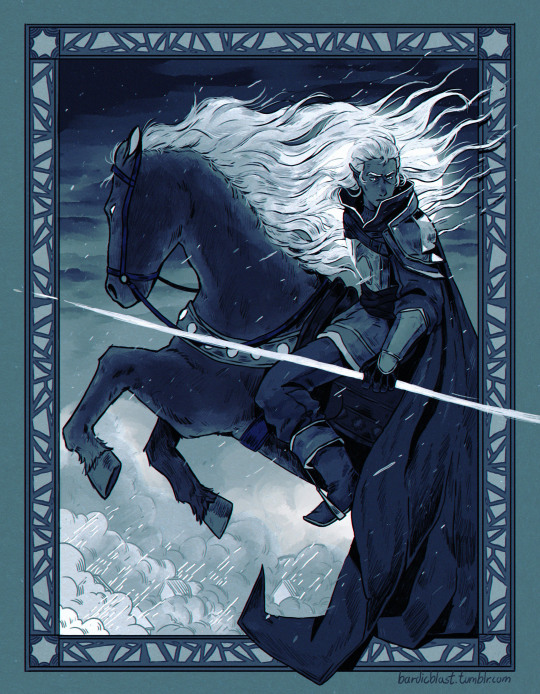
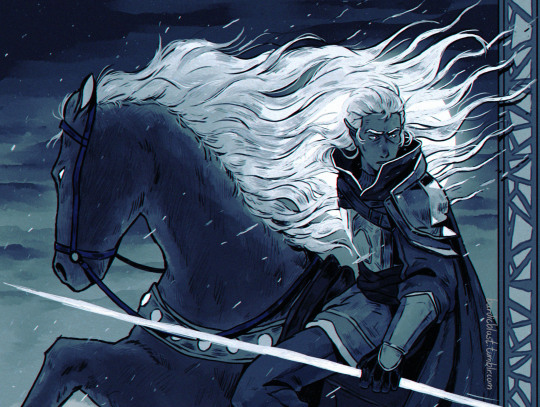
#dnd#curse of strahd#rahadin#dnd rahadin#dnd art#artists on tumblr#dnd character#dungeons and dragons#drow elf#dnd drow#i am goncharoving my way out here guys#wanting to do art featuring our rahadin but we dont know anything about him so im filling out the gaps vaguely#peeking just a little into his wiki page with half my eye so i can confirm One Thing#i am fighting the hardest battle over here trying to not spoil anything from how the original lore went down#i learned my lesson not to search for anything bc the guys on reddit wont bother hiding imortant details from the title#i am still laughing..when i was like collecting and writing names together i stumbled upon the name vasili which i did not remember where#that came up so i went okay imma just search it and a piano dropped on me immediately#i am still torn between: this detail fucks im glad i know vs it would have been bonkers if i experienced the piano drop during session#plus the amount im on the cos tag this info is everywhere so there is no way around it anyway
423 notes
·
View notes
Text

"Welcome to my performance!"
After literally months of drawing this, it's finally finished!! I tried to draw something inspired by splash art, so it's quite different from my usual art,,
Close ups down below!! 👇



#cookie run#cookie run kingdom#crk#beast yeast#shadow milk cookie#shadow milk#Im trying to think of titles for my future art since all of my file names are a MESS#it took so long???#but tbh the whole piece is massive#digital art#character design
161 notes
·
View notes
Text
Arthur and John each have a moment in the narrative where one perform a "leap of faith" and the other saves them. Both moments are quite interesting and serve to help the characters realise thay are no longer alone and that they can truly rely on one another (full analysis here, if you're interested).
However, I think there is a third "leap of faith" that occurs way later on... however this time the focus is neither John or Arthur, instead the character being saved is Noel.
Just like Arthur and John, the detective was forced to learn to be independent and self-reliant to ensure his own survival. He was separated very abruptly, and subsequently lost his only friend before being stuck in the Dreamlands. He was completely on his own against the King in Yellow, who tortured him relentlessly and cruelly for months. Noel was then carelessly spit back out in Arkham, traumatised and alone, and had to rebuild his life back up without being able to rely on anyone else.
How could he ever hope to explain all the horrors he was subjected to when no one could ever even begin to understand half of what he had to endure?
But then, years later he meets John and Arthur, and it seems that they can and do understand him. Noel allows Arthur to share his experiences in the Dreamlands... and the detective allows himself to finally recount his story too.
Then, in Part 40, Noel infiltrated a cultist base with John and Arthur and everything goes sideways. His trust in the characters is momentarily broken when John's real identity is revealed to him. Noel is then weakened by reliving his experience in the Dreamlands and nearly loses himself as the King in Yellow once again controls his mind and nearly kills him...
Noel takes a leap:
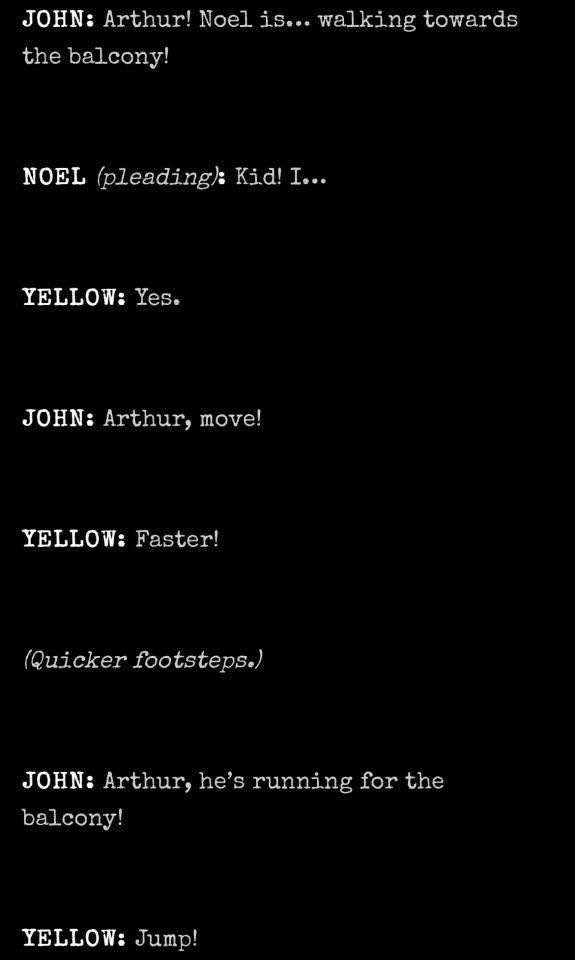
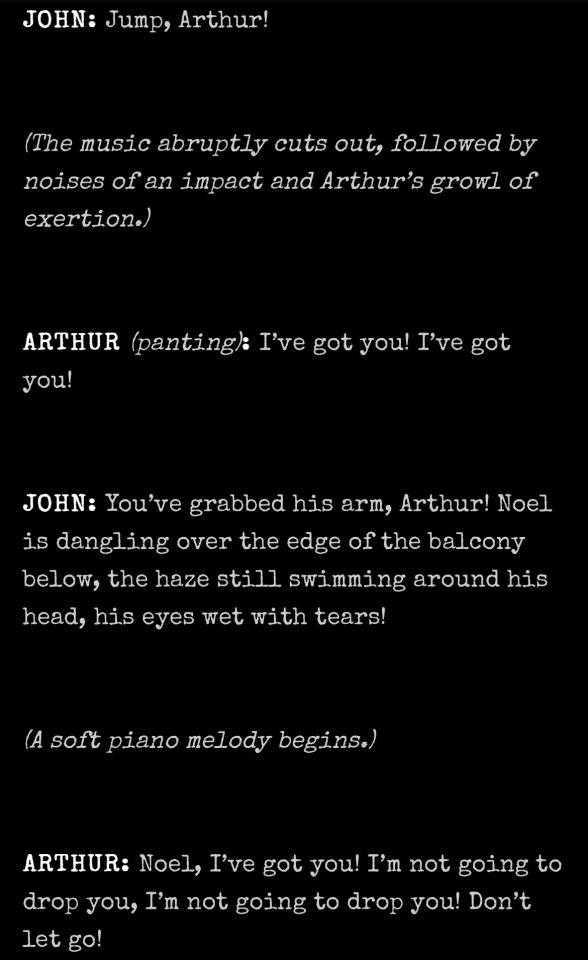
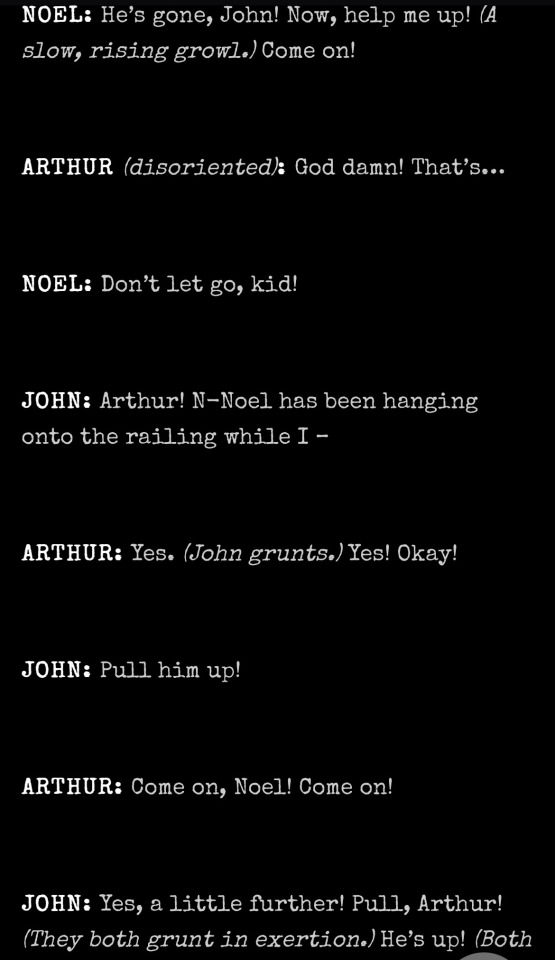
Noel was the first character that not only knew about Arthur and John's sharing a body situation, but also the first that wholly accepted them and tried to understand them better. It's only right that both Arthur and John reached out to help him and save him when he nearly lost himself.
As a side note, I think it’s really interesting how Arthur kept calling him out using his real name (Charlie), while John tried to reach him using his chosen name (Noel) during this scene. It's such an excellent, little detail which I really enjoyed.

I like to think that the use of both names is because just as Charlie/ Noel accepted both John and Arthur both as a unit and as separate people, the two characters are doing the same by accepting and recognising both the detective’s (past and present) identities as well. They decide to accept and save any and all versions of Charlie/ Noel.
Of course this is not the only interpretation. For example, the use of one name or the other might reflect how John and Arthur are recognising core parts of themselves within Noel/ Charlie instead.
John is calling the detective by his chosen name because he is honouring Noel's choice to start anew. Noel had been hurt in every possible way and reduced to nothing after his experience in the Dreamlands. The detective found that the only way to move forwards was by leaving all the (too far) damaged parts of himself behind and try to create a new self. A clean slate and new name for a new beginning to start a better life somewhere new. He needed to leave his past behind and forget the parts of himself he didn't want anymore. That was what John did too when he dissociated from the King in Yellow and began forming his own identity.
On the other hand, Arthur is calling the detective by his real name because he is honouring the person Charlie was in the past. Charlie was the part of himself that he left behind because he deemed too damaged and too ugly to salvage. Arthur drags behind his past mistakes like deadweight, he carries all the guilt and sorrow with him wherever he goes. He wants to believe that all the hurt, all the damage and all the scars he deems as the ugliest parts of himself don't make him an utterly repulsive and unlovable monster. I think he is trying to demonstrate that Charlie is just as worthy of being saved as Noel is, weaknesses and broken parts included.
Hm, and I seem to have gone off a giant tangent here... I shall stop blabbering now before I completely lose track of what this analysis was supposed to be about.
#malevolent#malevolent spoilers#malevolent part 40#arthur lester#john doe#charlie dowd#noel finley#detective noel#and now i am just going to be a little silly in the tags. so pardon me for my nonsense:#arthur and john are given the name dies irae and this title implies their decision to either save or condemn other characters-#is absolute and just. so if we take into account that they BOTH made the conscious decision to reach out and SAVE noel...#maybe i am just delusional but it wouldn't make sense for the detective to die right after this scene#SO what i am trying to say is that noel survived the gunshot wound to the neck and did not die at the end of s4. in this essay i will--
95 notes
·
View notes
Text
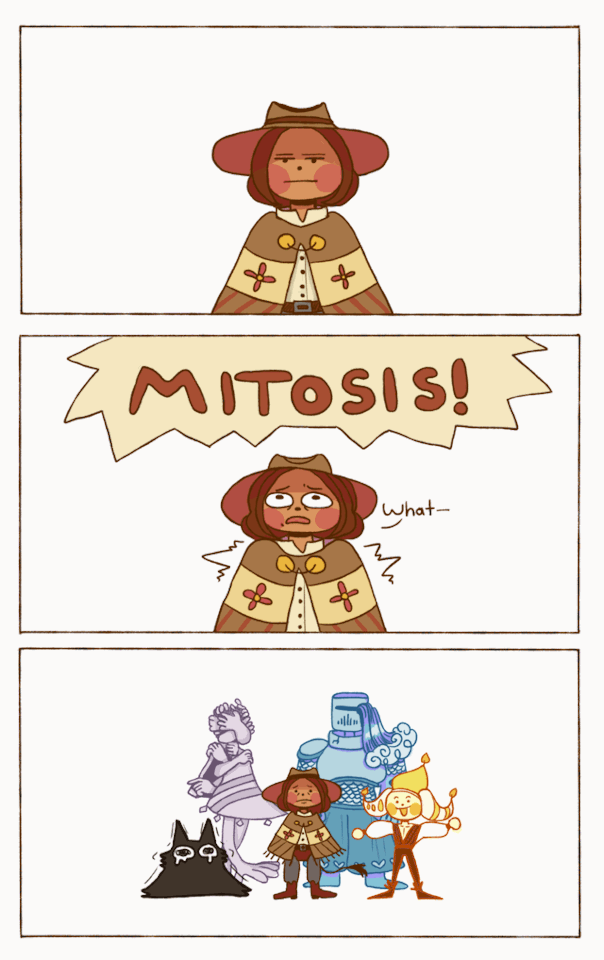
Party of one (divided into four)
#Fourfold Soul#Thing#QUIT#Ruth#Jolis#Finally I can offer some character names!#digital art#I have been hard at work in the character design mines for nearly two months.#I feel like a parent watching my child waddle off to kindergarten....ah...only yesterday you were a wee little mspaint sketch.#The title of 'Fourfold Soul' comes from the 'party' for this RPG being comprised of parts of yourself!#They all have a delightful array of personalities; and by delightful I do mean 'They are personal demons for a reason'.#It's a story about fighting alongside (and against) 'difficult' aspects of yourself.#This is also a story about redemption and reflection. Many other things too - but that is for another time.#(The clown pictured here is indeed the ignored clown from the last comic. Say hello to Jolis!)#If I had more time I would have added more animation and frames...next time...#I'm slowly getting back into my animation practice and experimentation. I will get more powerful! I promise!#Thank you all so much for all the love and support you have shown this project so far!#I was terribly nervous about posting the previous comic...the kindness it was met with meant a lot B'*)
223 notes
·
View notes
Text


Let’s all draw our oc’s from middle school and smile and laugh and play games :o] <3
Warning 2010’s cringe content below! 👇🥸🛑

#old ocs#nuggyy art#ocs#artists on tumblr#character design#I don’t think I would ever properly reuse these characters just because they are so much a product of their time#but I would 1) change their names jobs etc. 2) change the story titles because they were very very bad 3) make them look more like#the animals they’re based off and just go full furry mode#should I draw my weird weirdo ocs from the same era next…. those I have revamped in the past but again soooo early 2010s it’s hard to ignore#lmaoooo#sometimes you just have to draw your old guys to see just how far you’ve come…#14 years of improvement babeyyyy
95 notes
·
View notes